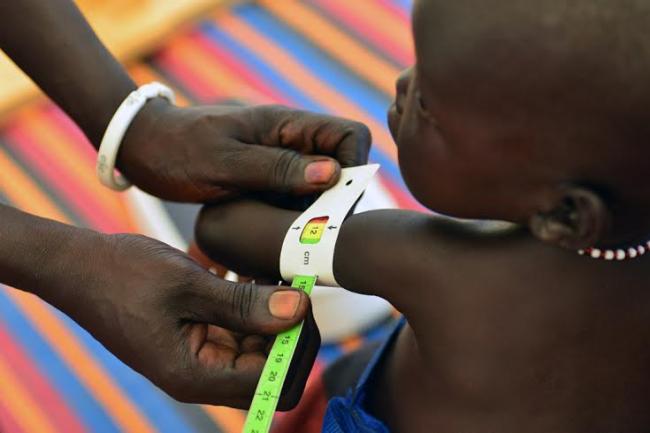10 Sep 2015, 07:42 am Print

“Last year we helped avert a famine. Now we must increase our efforts to avoid a catastrophic loss of young children’s lives,” said Jonathan Veitch, the Representative of the UN Children’s Fund (UNICEF) in South Sudan.
UNICEF and the World Food Programme (WFP) jointly announced the launch of an enhanced joint nutrition response plan covering all states in South Sudan, which will see both agencies and their partners assist over two million people – children, pregnant women and new mothers – for the treatment and prevention of acute malnutrition in the country until May 2016.
The two agencies began the joint nutrition approach last year, helping to avert famine and save lives by reaching one million people using joint rapid response teams in the conflict-affected states and ramping up the response in non-conflict states, according to the announcement.
“In the first year, we worked under extremely difficult conditions to bring much needed nutrition assistance to as many people and as many places in the country as we possibly could,” said Joyce Luma, the WFP Country Director in South Sudan. “Looking forward, we want to improve on the quality of nutrition services to continue to prevent and treat acute malnutrition.”
The nutrition response plan will work to address the root causes of malnutrition, such as poverty, inadequate water and sanitation, and infant and young child feeding practices.
“While a peace agreement signed in August provides hope for the new country, basic health and nutrition services remain out of reach for much of the population,” said the announcement.
“Basic services that were re-established over the past year have been destroyed, including hospitals, clean water, nutrition treatment sites – both out-patient and in-patient facilities,” the announcement added.
Since fighting broke out in December 2013, more than two million people have been uprooted from their homes in South Sudan, more than half of them children.
UNICEF said with another child becoming severely malnourished every two minutes in South Sudan, humanitarian agencies continue facing challenges to reach and provide sustained nutrition services to this affected population.
The nutrition programme in South Sudan is funded by, among others, the European Commission, Japan, Norway, Switzerland, the United Kingdom, and the United States.
Photo: UNICEF/Christine Nesbitt
- UK: Media regulator Ofcom imposes first £1mn Online Safety Act fine against porn site provider
- War stole their classrooms: 4.6 million Ukrainian children face learning barriers in year four of Russian invasion
- Terrifying Reality: 600 Million Children Exposed to Home Violence Worldwide, alerts UNICEF
- Schools in fear: Abduction of over 200 students triggers panic across Nigeria
- UNICEF'S new report shows 8 million teens in world's wealthiest countries functionally illiterate





-1763561110.jpg)
